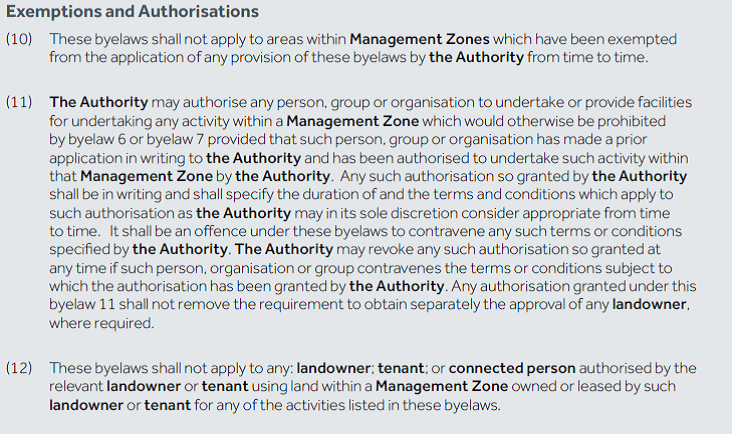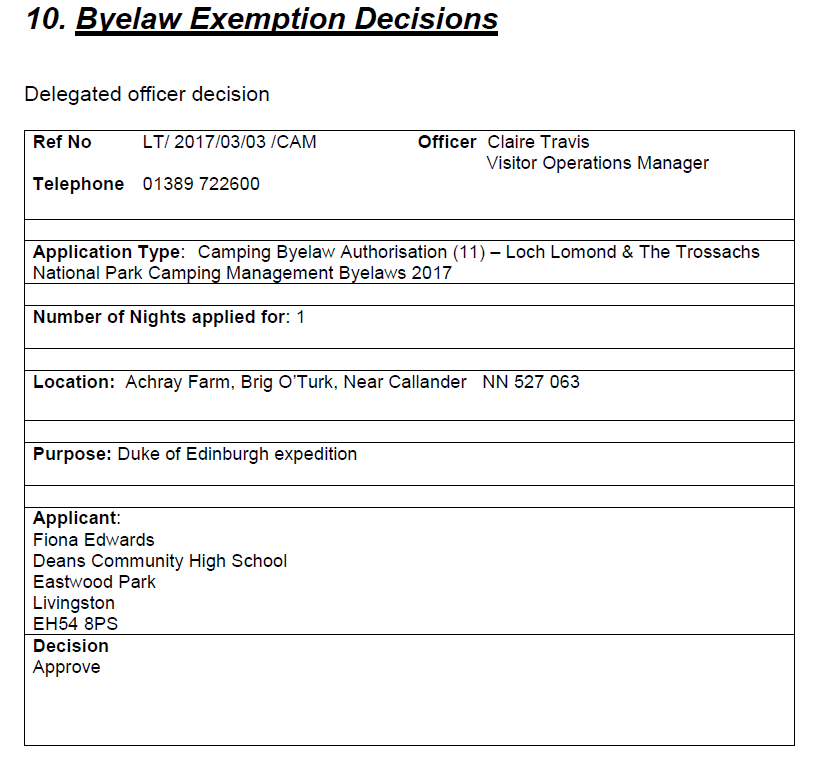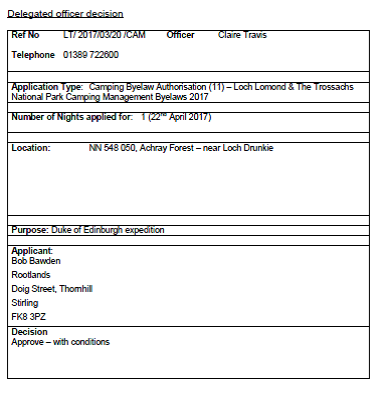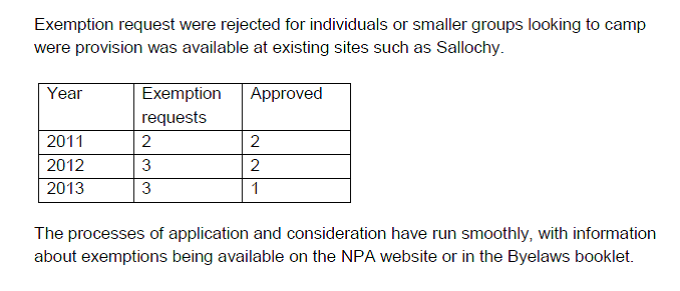 Camping byelaw 10 and 11 provides for exemptions from the camping byelaws in the Loch Lomond and Trossachs National Park. Camping byelaw 10 is for land (e.g campsites) and byelaw 11 for people. The Loch Lomond and Trossachs National Park Authority has used byelaw 11 to set up permit areas within the camping management zones (except that many of these places are unfit for camping (see here) and (here)). Byelaw 11 also allows people to apply for exemptions in other areas in the camping management zones. At present though the LLTNPA has only advertised this facility on its camping pages to groups (see here) such as the Scouts and the Duke of Edinburgh Award Scheme.
Camping byelaw 10 and 11 provides for exemptions from the camping byelaws in the Loch Lomond and Trossachs National Park. Camping byelaw 10 is for land (e.g campsites) and byelaw 11 for people. The Loch Lomond and Trossachs National Park Authority has used byelaw 11 to set up permit areas within the camping management zones (except that many of these places are unfit for camping (see here) and (here)). Byelaw 11 also allows people to apply for exemptions in other areas in the camping management zones. At present though the LLTNPA has only advertised this facility on its camping pages to groups (see here) such as the Scouts and the Duke of Edinburgh Award Scheme.
The reason for this, I believe, is not because the LLTNPA cares about young people being able to experience the countryside – under the terms and conditions for the Loch Chon campsite people under 16 are banned from staying unless there is an adult with them while young backpackers walking the West Highland Way have been hit hard by the byelaws on east Loch Lomond – but because the Scouts and D of E were very concerned about the proposed byelaws and the Park wanted to buy them off. In fact the LLTNPA does not charge them for permits. A clear case of divide and rule among recreational groups.
The camping permit areas created by the LLTNPA are of limited use to the Duke of Edinburgh Award Scheme and the Scouts. This is partly because one of the points of going on expeditions is to encourage young people to be self-reliant and being herded together with other campers in permit zones is little different to being on a campsite. Its also because the permit zones may not fit with expedition routes. The LLTNPA, having removed the right to choose somewhere to camp on the lochshores where no one else is present, if that is what you wanted to do, or to suit your journey (eg if you are backpacking the West Highland Way) has in effect reinstated this for formal youth groups. If this is the right thing to do for youth groups though, and I think it is, it should be right for everyone else too. The way the LLTNPA is managing exemptions for formal groups just exposes further the unfairness of the byelaws.
LLTNPA officers have, however, set up a system where organised youth groups need to apply for exemptions at least four weeks in advance and each application is then advertised on the weekly planning list (though its not clear if anyone can object – under the Scheme of Delegation approved by the Board at its December meeting its up to officers to decide). What the system does is extend control over youth groups even beyond what was explicitly stated in the byelaws. Its also hugely bureaucratic – if you don’t believe this read the form that groups have to fill in Group-permit-application
The planning list shows there have already been two exemptions approved for Duke of Edinburgh expeditions and two more are in the pipeline. Here is an example:

The application form states that the LLTNPA may apply further terms and conditions to exemptions  over and above the provisions in the standard terms and conditions for permit areas. Since breach of the terms and conditions under byelaw 11 creates a new criminal offence, what this means is Park staff can create even more criminal offences for youth groups – or in other words increase control over them. Its like creating an anti-social behaviour order for youth groups (rather than individuals) which controls what they do and when. While NO terms and conditions have been applied to the exemption above, they have been applied to the other application which was approved – see left – although what these conditions are is not stated. They should be. Another case of Park staff developing controls in secret.
over and above the provisions in the standard terms and conditions for permit areas. Since breach of the terms and conditions under byelaw 11 creates a new criminal offence, what this means is Park staff can create even more criminal offences for youth groups – or in other words increase control over them. Its like creating an anti-social behaviour order for youth groups (rather than individuals) which controls what they do and when. While NO terms and conditions have been applied to the exemption above, they have been applied to the other application which was approved – see left – although what these conditions are is not stated. They should be. Another case of Park staff developing controls in secret.
In terms of the fairness about how applications for exemptions are decided, I have not been able to find anything on the LLTNPA website which says how they will do this, although procedures are meant to be in place:

The criteria should be public to ensure that the LLTNPA is not discriminating in favour of one recreational group against other recreational groups or users.
The criteria also need to be made public because local residents and businesses need to apply for exemptions (see here) if they want to avoid friends or staff committing criminal offences, such as where they sleep in a tent overnight a garden or in a caravan within the camping management zones. Local residents need to know what criteria will be used to decide applications they might make and also to ensure there is not one set of criteria for local residents and another for visitors.
Before the end of March there had been more applications for exemptions (I know of at least five) than happened in any year of the east Loch Lomond byelaws.

Its quite predictable that the number of exemption requests under the new byelaws is going to escalate and it appears the LLTNPA has not thought through either the cost implications of managing this or how it will manage this fairly. I don’t think it can. Access Rights were and are fair. They allow you to camp as long as you do this responsibly. There never was any need for the LLTNPA to add to this, the existing criminal law was quite sufficient but the Park is now trying to micro manage people’s behaviour.
That they are doing so should, in my view, be seen as part of a wider programme of social control. I have just been reading George Monbiot book of essays, “How did we get into this mess?”. This has many has interesting things to say about the increasing social control of young people and the impact of their increasing exclusion from nature. The camping byelaws and the way exemptions are being managed, with ever more controls being put in place, are a good example of this. The National Park should have been a breathing space for people from the Glasgow conurbation, instead its becoming a highly controlled place.
